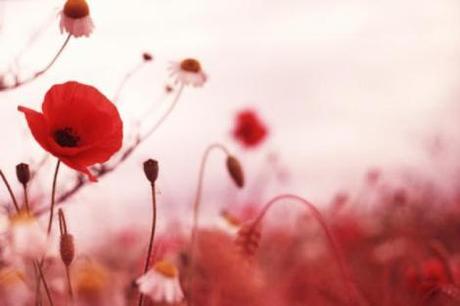
Topical! This was written by a friend of mine:
British people are well-known for their aversion to national symbols, almost as much as the Germans. Flag-waving is strictly limited to sports and the occasional royal event, and even then, a lot of people unknowingly flaunt it upside-down or back-to-front. There’s none of this Scandinavian miniature flag nonsense, where personal celebrations and national flags collide in confusing fashion – British birthday cakes are decorated with those silver balls that don’t really taste of anything, and British Christmas trees are crowned with angels haphazardly made out of cardboard, dry pasta shapes, and liberal splashings of glitter-glue. As far as most Brits are concerned, the personal and the private are no domain for the patriotic. It makes us uncomfortable.
It’s not just flags, crowns, and bulldogs, though. I’ve realised that we’ve slowly acquired another national symbol, which is happily paraded around by almost all. This symbol is the Remembrance Poppy.
For decades, the poppy has been sold by the British Legion as a reminder of the sacrifices of the people who fought in the two world wars, and to raise funds for the wounded and bereaved at a time when the UK was falling apart at the seams. It is entirely apolitical. Or at least, it’s supposed to be, but their tone has changed significantly over the last few years. The last veteran of the First World War passed away earlier this year, and the number of veterans from the Second World War is in rapid decline. How, then, to prolong the relevance of the Poppy Appeal when we are losing the living connections to its origins?
Straight-up nationalism generally does the job. The conflicts in Afghanistan and Iraq saw a shift in the focus of the Poppy Appeal from commemorating the fallen to celebrating the fighting. Suddenly, it wasn’t about taking a moment to remember Europe’s abject mistakes of the 20th century; how a Balkan protest escalated into a pointless and confusing bloodbath, how spiteful triumphalism fostered rampant fascism which fostered no end of terrible things. Instead, it increasingly concerns the glorification of present-day soldiers, hoping that popular support will disguise the stark fact that the UK is involved in illegal occupations overseas which don’t concern domestic interests and have dragged on longer than the two world wars combined.
This rhetoric is everywhere. On the radio, I am urged to support our boys; glossy magazines guilt me into valuing the sacrifices they make; advertising campaigns venerate the heroes who are defending our freedoms.
No. I don’t, I can’t. There are two fundamental differences between the world wars and the Blair wars – conscription and consequence. The soldiers of the First and Second World Wars were our boys, conscripted as they were from cities, towns, and villages across the country. Every settlement in the UK will have a memorial to their local farmers, postmen, teachers, factory workers, train drivers, and shopkeepers who were called up, sent to the Front, and killed. They, it is fair to say, made sacrifices. Likewise, they were genuinely defending our freedoms, as the potential consequences of the world wars for the UK were dire. They were not optional wars – the consequences would have been invasion and subjugation.
Modern soldiers, however, are not conscripts. The men and women who shipped out to Iraq and Afghanistan actively chose that career path, with full knowledge of what could happen to them, and without wanting to generalise, this does disproportionately attract a certain kind of person. I once had the dubious pleasure of sharing a pub table with a group of soldiers on leave from Afghanistan. They spent a long time boasting about how many ragheads they’d killed, about how beating the shit out of civilians is the mark of a real man. I quietly read my book, glad to be very much a beta male by their standards. While some soldiers do heroic things, it’s their job and they are paid for it. Soldiers are not heroes by default of position.
Modern wars, furthermore, are not mandatory. Let’s stop kidding ourselves – our freedoms are not at stake here. My right to a secret vote for a variety of candidates is not centrally administered from Kandahar. Insurgents in Helmand frankly couldn’t care less about my right to a fair trial. Abolishing my right to express my opinions without fear of state recrimination was never on Saddam’s to-do list.
This is why I don’t wear a poppy anymore. I object to the slow and subtle realignment of the Poppy Appeal from pacifist contemplation to popular justification. I object to the sheer disrespect of directly comparing the world wars with the modern wars and using the cause of the former to vindicate the latter. I object to the patriotic peer pressure to wear what is now, in my eyes, a national symbol. It makes me uncomfortable in the same way.
It’s sad what people forget during Remembrance.
“War is organised murder,” he insisted, “and nothing else.” He said that, for him, 11 November was “just showbusiness”. Instead, “the day I lost my pals”, 22 September 1917, was his true remembrance day. Trench dogs had fought over biscuits snaffled from dead men’s tunics, and Patch had thought, “what are we doing that’s really any different? Two civilised nations, British and German, fighting for our lives.”
